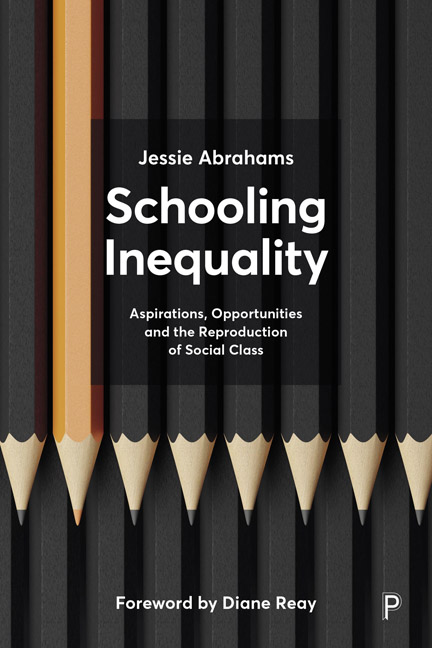Book contents
- Frontmatter
- Dedication
- Contents
- List of figures and tables
- List of abbreviations
- Acknowledgements
- Foreword
- Introduction
- 1 Reproduction: social class inequality in education
- 2 The three schools
- 3 Aspiration, aspiration, aspiration: “The only thing they’ve forced me to do is keep my options open”
- 4 Knowledge, familiarity and physical proximity: “Everyone in my family has gone to university, I don’t see why I shouldn’t”
- 5 Option blocks that block options (GCSEs)
- 6 Packages, facilitating subjects and ‘keeping the options open’ (A levels)
- 7 Institutional concerted cultivation
- 8 Aim lower: leashing aspirations and internalising notions of (in)ability
- 9 Jake’s story: a journey to reflexivity
- Conclusion
- Appendix I Questionnaire
- Appendix II Parental Standard Occupational Classification 2010 groups
- Appendix III Grand Hill Grammar careers event question sheet
- Appendix IV Vignette sample
- Notes
- References
- Index
3 - Aspiration, aspiration, aspiration: “The only thing they’ve forced me to do is keep my options open”
Published online by Cambridge University Press: 18 December 2024
- Frontmatter
- Dedication
- Contents
- List of figures and tables
- List of abbreviations
- Acknowledgements
- Foreword
- Introduction
- 1 Reproduction: social class inequality in education
- 2 The three schools
- 3 Aspiration, aspiration, aspiration: “The only thing they’ve forced me to do is keep my options open”
- 4 Knowledge, familiarity and physical proximity: “Everyone in my family has gone to university, I don’t see why I shouldn’t”
- 5 Option blocks that block options (GCSEs)
- 6 Packages, facilitating subjects and ‘keeping the options open’ (A levels)
- 7 Institutional concerted cultivation
- 8 Aim lower: leashing aspirations and internalising notions of (in)ability
- 9 Jake’s story: a journey to reflexivity
- Conclusion
- Appendix I Questionnaire
- Appendix II Parental Standard Occupational Classification 2010 groups
- Appendix III Grand Hill Grammar careers event question sheet
- Appendix IV Vignette sample
- Notes
- References
- Index
Summary
Introduction
This chapter begins to present the findings of this research through engaging with the career aspirations of the young people in each school. As was discussed in Chapter 1, the concept of ‘aspiration’ in public and policy discourse tends to be reified as a one-dimensional, narrow and linear ‘thing’; thus we see the rhetoric around ‘raising aspirations’ which is always in relation to careers and assumes a hierarchy of aspirations as real and measurable. Interestingly, in line with other literature (Brown, 2011; Roberts and Evans, 2012; Allen, 2013) the aspirations of the young people in this research provide a challenge to this conception of aspirations, as what constituted a legitimate and vocalised ‘aspiration’ varied across the cohort. When interviewing I asked all young people how they imagined themselves at 25 years old. While this question left room for responses to span wider than in respect of jobs, most of the young people chose to respond in respect of their career aspirations. Arguably young people are highly influenced by the widely acknowledged focus on thinking about and constructing a future around jobs. As was noted by St Clair and Benjamin (2011), aspirations are often voiced by young people to serve a specific purpose. The young people may have been responding to my question in line with what they thought that I wanted to hear. It is important to highlight that not all of the young people responded to the question (of how they visualised their future selves) in relation to jobs, and this was particularly noted during the plasticine modelling, which left more space for alternative visions.
Flo did have a few concrete jobs that she was interested in doing but these had simply not featured in her initial thoughts about herself in the future. The aspiration which she prioritised was that of where she lived. Flo even followed this up with connecting being a general practitioner (GP) over a doctor to wanting to live in the country (she envisioned GPs existing in the remote countryside but doctors, she said, needed to be in a city with a hospital). Flo, much like the young people in Brown's (2011) research, appeared to centralise and prioritise a future focused around happiness, which for her meant living in the countryside with animals.
- Type
- Chapter
- Information
- Schooling InequalityAspirations, Opportunities and the Reproduction of Social Class, pp. 37 - 57Publisher: Bristol University PressPrint publication year: 2024

